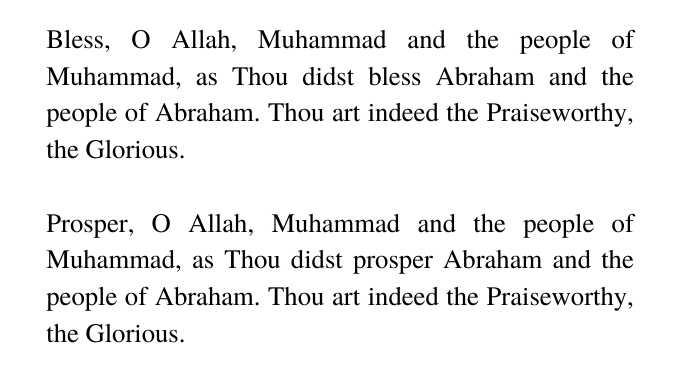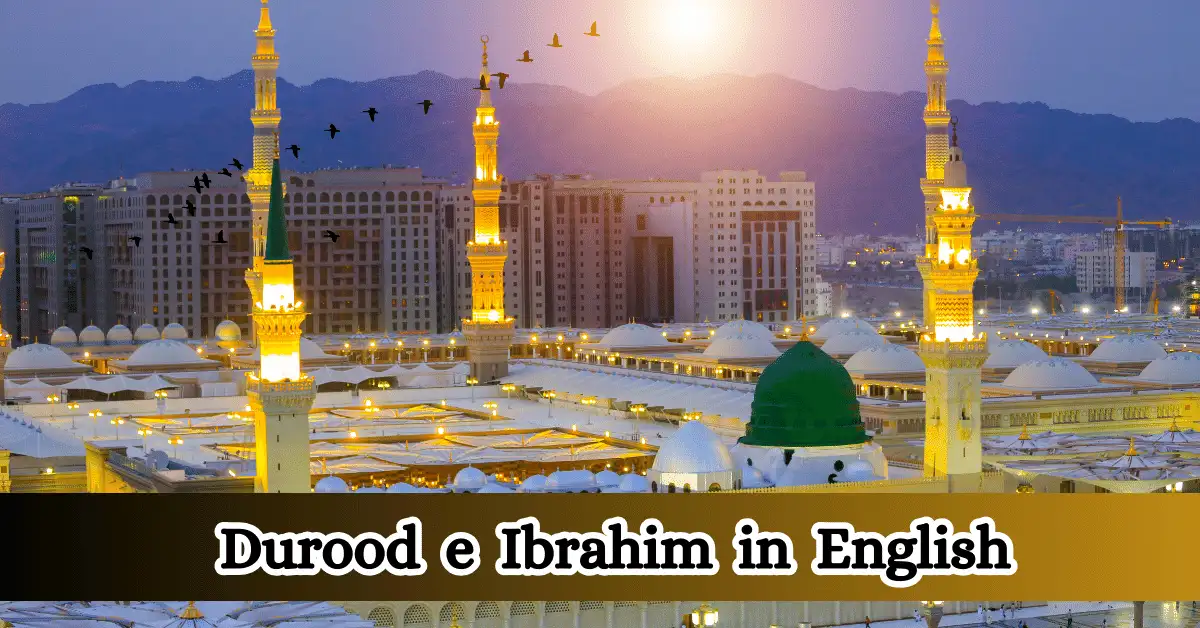“Durood e Ibrahim,” also known as “Salat al-Ibrahimiyya” or “Darood Sharif,” holds a special place in Islamic practice as a prayer for blessings upon the Prophet Muhammad (peace be upon him). It is a form of supplication and an expression of love, admiration, and respect for the final messenger of Islam. Here is an introduction to Durood Ibrahim:
This Durood is the best words of all the Durood, and its clauses are superior to all the Durood. The Holy Prophet has chosen this Durood for the prayers. Therefore, it is better to recite this Durood in the prayers and outside the prayers.
Hazrat Abdul Rahman ibn Abi Laila said: When I met Ka’b ibn Ujrah he said: May I give you an honor? which I have heard from the Hazrat Muhammad (PBUH)? I said: Give it.
He said: We asked the Rasool of Allah: How can we say Durood to Hazrat Muhammad (PBUH)? Because Allah Almighty has told us how to greet the Hazrat Muhammad (PBUH). he said: Read it like this: Then he recited Durood e Ibrahimi.
Durood e Ibrahim in English Transliteration

Transliteration: Allahumma salli ‘ala Muhammadin wa ‘ala ali Muhammadin kama sallaita ‘ala Ibrahim wa ‘ala ali Ibrahim, innaka Hamidun Majid.
Allahumma Barik’ala Muhammadin wa ‘ala ali Muhammadin kama barakta ‘ala Ibrahim wa ‘ala ali Ibrahim, innaka Hamidun Majid.
Hazrat Muhammad (PBUH) came one day and there were signs of happiness on his face. The Prophet said: Gabriel came to me and said: The Prophet would not be happy that whoever from among the ummah of the Prophet sends blessings upon the Prophet once, I send blessings upon him ten times. Whoever greets the Prophet once, I greet him ten times.
Hazrat Muhammad (PBUH) said: Whoever remembers me and forgets to send blessings on me Allahumma Salli Ala Muhammadin and Allahumma Barik Ala Muhammadin, he will forget the way to Paradise on the Day of Qayamat.
Durood e Ibrahim in English Translation

Hazrat Abu Sulaiman Al-Harrani narrates that one of my neighbors who was called by the name of Fazl and he was very devoted to worship. He told me that I used to write hadiths but I did not send blessings on the Holy Prophet (PBUH).
Then once I visited the Holy Prophet (PBUH) in a dream Hazrat Muhammad (PBUH) said to me: When you write my name or remember me, why do you not send blessings on me?
Then I once saw the Holy Prophet (sws) in a dream Hazrat Muhammad (PBUH) said: Your blessings have reached me, so when you send blessings on me or mention me, ”Peace be upon him.
Importance of Durood Ibrahim

This precious gift of the family of Hazrat Ibrahim (PBUH) was presented in favour of the Muhammadan Ummah. In return, the Muhammadan Ummah was commanded to pray in all five prayers for the Abrahamic family. Hazrat Muhammad (PBUH) explained this prayer in the form of Durood Ibrahim.
This Durood is an expression of the Prophet’s love for the family of Ibrahim. And out of this love, the Prophet (peace be upon him) named one of his sons Ibrahim. Besides, on the night of Ascension, Hazrat Ibrahim (PBUH) had said to the Holy Prophet (PBUH) that he would greet his Ummah with my greetings. In response to this greeting, the Holy Prophet (PBUH) greeted them in Durood Ibrahim.
- This Durood is very good because the words of this Durood are uttered by the Holy Prophet.
- Therefore, reciting this Durood frequently in addition to prayers is the best way to get religious and worldly blessings. And Allah’s mercy and pleasure are obtained.
- Everything in the world is made easier. And step by step, God’s help is involved.
- Needs are met. The intercession of the Holy Prophet (SWs) becomes obligatory.
- The scarcity of sustenance is removed. Wealth is blessed.
- The end is faith. In addition, all the stages related to the life of the Hereafter become easier.
- The one who recites this Durood, as usual, will go to heaven.
- The one who recites Durood does not eat dust in the grave or insects.
- Durood is the way to heaven.
- Every prayer of the one who recites darood sharif transliteration frequently is accepted.
- The sins of the one who recites Durood frequently are forgiven and the ranks are raised.
- Durood Pak is the key to success in both worlds.
- Allah Almighty also sends blessings on those who recite Durood. Not one for at least ten.
- Praying Durood raises ranks and sins are forgiven.
- As long as the servant recites Durood , the angels of Allah Almighty keep on praying for mercy and forgiveness for him.
- Therefore, we should all send as many blessings and peace upon our beloved master, Hazrat Muhammad. There is no doubt that the best Durood is the Durood-e-Ibrahimi. But you can recite any Durood .
Durood Shareef in Hadith
- It is narrated from Hazrat Ali (RA) that there are some angels on the earth of Allah who were created from light and they descend on the earth only on Friday night and on Friday. In their hands are gold pens and silver inkpot and light sheets and they only write blessings on Hazrat Muhammad (PBUH).
- The Holy Prophet (peace and blessings of Allaah be upon him) said: Verily, Allaah has appointed an angel in my grave to whom Allaah has given the power to hear the voices of all creatures. So whoever prays for me on the day of Qayamat, the angel will convey to me the name of the one who prays and the name of his father.
- Hazrat Muhammad (PBUH) said: He who sends blessings upon the Prophet and says: O my Allaah! Make the Prophet near to you on the Day of Resurrection, for which my intercession becomes obligatory.
- Hazrat Muhammad (PBUH) said: When one of you enters the mosque, send greetings to Hazrat Muhammad (PBUH) and then say: I ask Allah for mercy and when you leave the mosque Say: I ask God’s grace.
